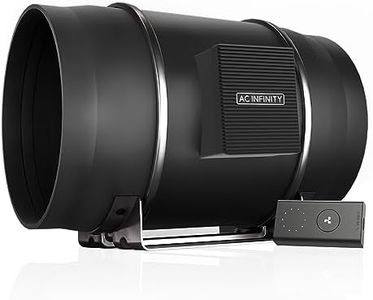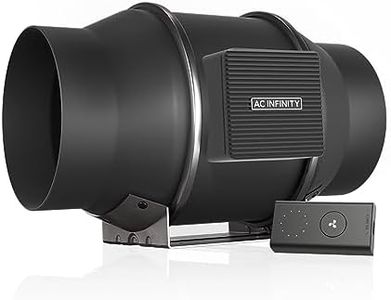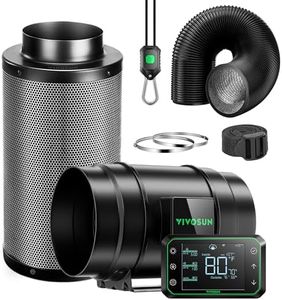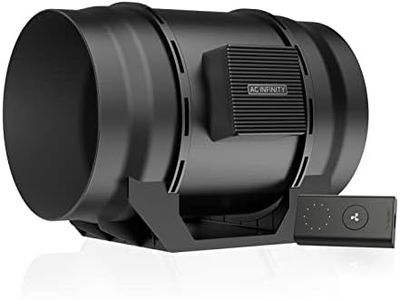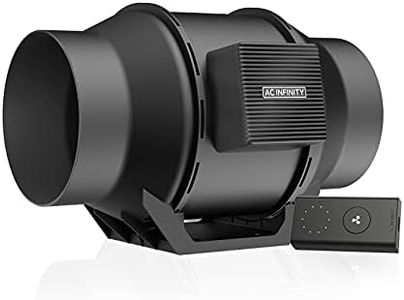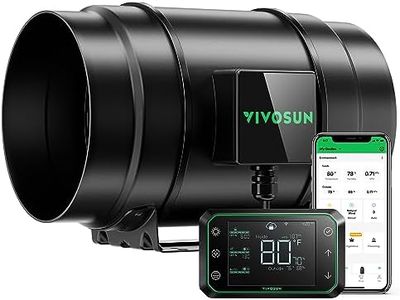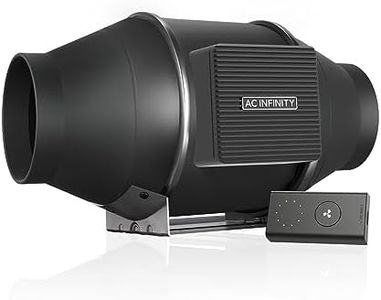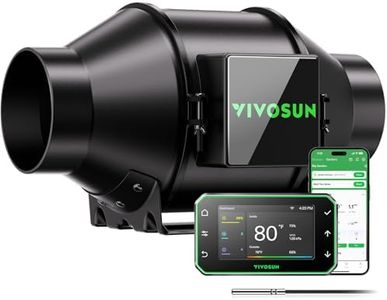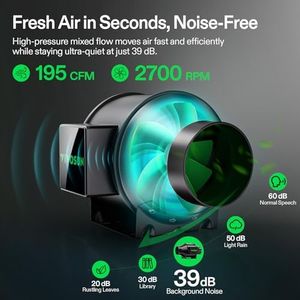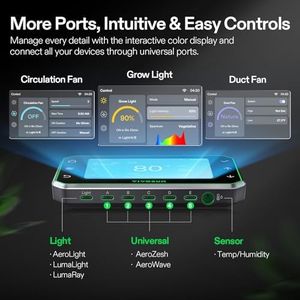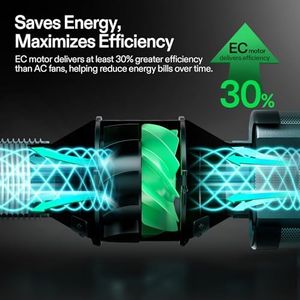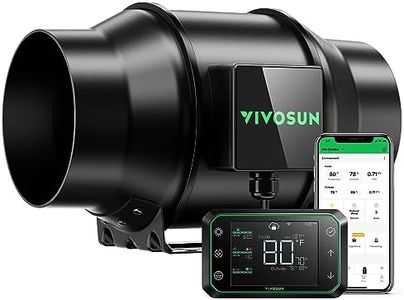9 Best Duct Booster Fans 2026 in the United States
Winner
AC Infinity CLOUDLINE PRO S12, Quiet 12” Inline Duct Fan with Speed Controller - EC Motor Ventilation Exhaust Fan for Heating Cooling Booster, Grow Tents, Hydroponics
The AC Infinity CLOUDLINE PRO S12 is a powerful 12-inch inline duct booster fan that delivers strong airflow at 1604 CFM, making it well-suited for ventilation in grow rooms, HVAC systems, or cooling electronic closets. It operates relatively quietly at 62 dB, which is moderate noise for its size. Installation is straightforward for indoor use, and it comes with a wired 10-speed controller, plus it’s compatible with smart app controls for flexible operation.
Most important from
29213 reviews
AC Infinity CLOUDLINE PRO S10, Quiet 10” Inline Duct Fan with Speed Controller - EC Motor Ventilation Exhaust Fan for Heating Cooling Booster, Grow Tents, Hydroponics
The AC Infinity CLOUDLINE PRO S10 is a powerful and efficient 10-inch inline duct booster fan designed primarily for ventilation in hydroponic grow rooms and other indoor settings. With an impressive airflow of 1201 CFM, this fan is capable of effectively moving large volumes of air, making it ideal for environments needing robust ventilation. Its PWM-controlled EC motor ensures that the fan operates quietly, generating only 48 dBA of noise, which is a significant advantage for users who require a peaceful atmosphere, such as in grow tents or living spaces.
Most important from
29213 reviews
AC Infinity CLOUDLINE PRO S6, Quiet 6” Inline Duct Fan with Speed Controller - EC Motor Ventilation Exhaust Fan for Heating Cooling Booster, Grow Tents, Hydroponics
The AC Infinity CLOUDLINE PRO S6 is a solid choice if you need a quiet and efficient 6-inch inline duct booster fan. It delivers airflow at 402 CFM, which is strong enough to improve ventilation in spaces like grow tents, small rooms, or AV cabinets. One of its nicest features is how quiet it runs at just 32 dB—low enough not to be distracting in most indoor settings. Installation is straightforward with its 6-inch duct size, compatible with common ductwork, and it’s designed for indoor use only. You’ll appreciate the 10-speed wired controller, giving you good flexibility to adjust airflow as needed, plus compatibility with smart controllers if you want more advanced control options. Energy-wise, it uses a PWM-controlled EC motor, which means it runs efficiently, generating less heat and consuming less power compared to typical fans. The fan’s mixed flow design helps push air effectively even when duct resistance is high, which is important for maintaining good ventilation in tighter spaces.
Most important from
29213 reviews
Top 9 Best Duct Booster Fans 2026 in the United States
Winner
AC Infinity CLOUDLINE PRO S12, Quiet 12” Inline Duct Fan with Speed Controller - EC Motor Ventilation Exhaust Fan for Heating Cooling Booster, Grow Tents, Hydroponics
AC Infinity CLOUDLINE PRO S12, Quiet 12” Inline Duct Fan with Speed Controller - EC Motor Ventilation Exhaust Fan for Heating Cooling Booster, Grow Tents, Hydroponics
Chosen by 1201 this week
AC Infinity CLOUDLINE PRO S10, Quiet 10” Inline Duct Fan with Speed Controller - EC Motor Ventilation Exhaust Fan for Heating Cooling Booster, Grow Tents, Hydroponics
AC Infinity CLOUDLINE PRO S10, Quiet 10” Inline Duct Fan with Speed Controller - EC Motor Ventilation Exhaust Fan for Heating Cooling Booster, Grow Tents, Hydroponics
AC Infinity CLOUDLINE PRO S6, Quiet 6” Inline Duct Fan with Speed Controller - EC Motor Ventilation Exhaust Fan for Heating Cooling Booster, Grow Tents, Hydroponics
AC Infinity CLOUDLINE PRO S6, Quiet 6” Inline Duct Fan with Speed Controller - EC Motor Ventilation Exhaust Fan for Heating Cooling Booster, Grow Tents, Hydroponics
AC Infinity CLOUDLINE A8, Quiet 8" Inline Duct Fan with Speed Controller, EC Motor - Ventilation Exhaust Fan for Heating Cooling Booster, Grow Tents, Hydroponics
AC Infinity CLOUDLINE A8, Quiet 8" Inline Duct Fan with Speed Controller, EC Motor - Ventilation Exhaust Fan for Heating Cooling Booster, Grow Tents, Hydroponics
AC Infinity CLOUDLINE A6, Quiet 6” Inline Duct Fan with Speed Controller, EC Motor - Ventilation Exhaust Fan for Heating Cooling Booster, Grow Tents, Hydroponics
AC Infinity CLOUDLINE A6, Quiet 6” Inline Duct Fan with Speed Controller, EC Motor - Ventilation Exhaust Fan for Heating Cooling Booster, Grow Tents, Hydroponics
AC Infinity CLOUDLINE S8 PRO, Quiet 8” Inline Duct Fan with 10-Speed Controller, EC-Motor Ventilation Exhaust Fan for Heating Cooling Booster, Grow Tents, Hydroponics
AC Infinity CLOUDLINE S8 PRO, Quiet 8” Inline Duct Fan with 10-Speed Controller, EC-Motor Ventilation Exhaust Fan for Heating Cooling Booster, Grow Tents, Hydroponics
AC Infinity CLOUDLINE PRO S4, Quiet 4” Inline Duct Fan with Speed Controller – EC Motor Ventilation Exhaust Fan for Heating Cooling Booster, Grow Tents, Hydroponics
AC Infinity CLOUDLINE PRO S4, Quiet 4” Inline Duct Fan with Speed Controller – EC Motor Ventilation Exhaust Fan for Heating Cooling Booster, Grow Tents, Hydroponics
Our technology thoroughly searches through the online shopping world, reviewing hundreds of sites. We then process and analyze this information, updating in real-time to bring you the latest top-rated products. This way, you always get the best and most current options available.

